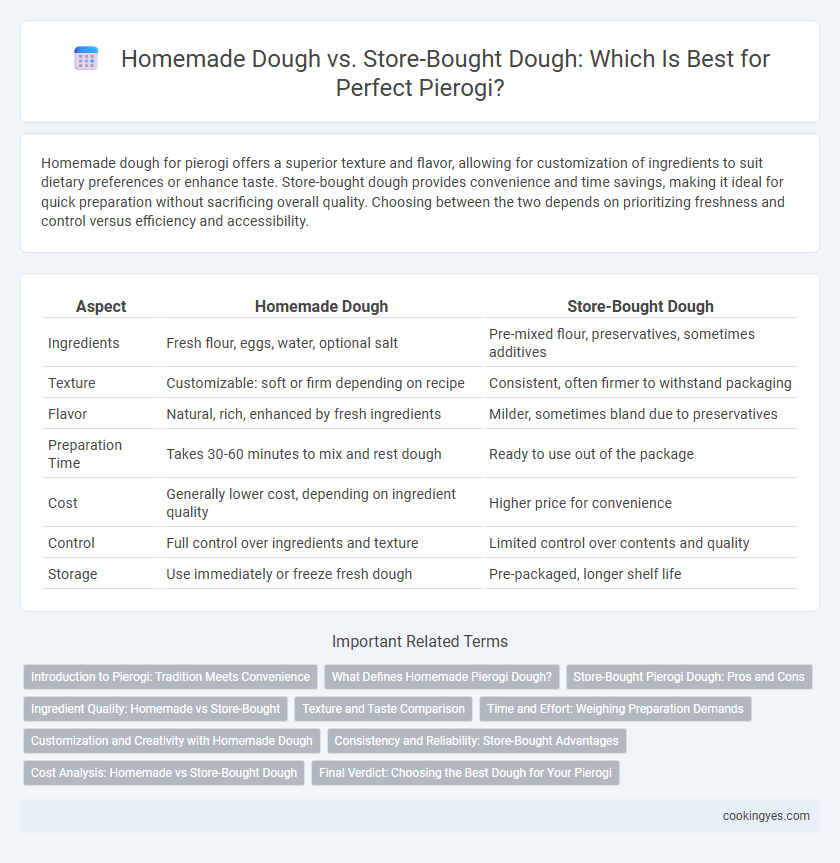Homemade dough for pierogi offers a superior texture and flavor, allowing for customization of ingredients to suit dietary preferences or enhance taste. Store-bought dough provides convenience and time savings, making it ideal for quick preparation without sacrificing overall quality. Choosing between the two depends on prioritizing freshness and control versus efficiency and accessibility.
Table of Comparison
| Aspect | Homemade Dough | Store-Bought Dough |
|---|---|---|
| Ingredients | Fresh flour, eggs, water, optional salt | Pre-mixed flour, preservatives, sometimes additives |
| Texture | Customizable: soft or firm depending on recipe | Consistent, often firmer to withstand packaging |
| Flavor | Natural, rich, enhanced by fresh ingredients | Milder, sometimes bland due to preservatives |
| Preparation Time | Takes 30-60 minutes to mix and rest dough | Ready to use out of the package |
| Cost | Generally lower cost, depending on ingredient quality | Higher price for convenience |
| Control | Full control over ingredients and texture | Limited control over contents and quality |
| Storage | Use immediately or freeze fresh dough | Pre-packaged, longer shelf life |
Introduction to Pierogi: Tradition Meets Convenience
Homemade dough for pierogi delivers a tender, authentic texture crafted from basic ingredients like flour, eggs, and water, embracing traditional Eastern European culinary heritage. Store-bought dough offers convenience and consistent quality, making pierogi preparation faster without sacrificing flavor. Choosing between homemade and store-bought dough balances the desire for artisanal taste with time-saving practicality in pierogi making.
What Defines Homemade Pierogi Dough?
Homemade pierogi dough is defined by its simple, fresh ingredients--typically flour, water, eggs, and a pinch of salt--combined and kneaded to achieve a soft, pliable texture that withstands boiling without falling apart. Unlike store-bought dough, which may contain preservatives or stabilizers, homemade dough offers superior elasticity and a tender bite, enhancing the overall pierogi experience. The ability to control thickness and consistency ensures that homemade dough perfectly encases fillings, resulting in authentic pierogi with a rich, satisfying texture.
Store-Bought Pierogi Dough: Pros and Cons
Store-bought pierogi dough offers convenience and time-saving benefits, making it ideal for quick meal preparation without sacrificing basic texture. However, it often lacks the authentic flavor and customizable thickness of homemade dough, potentially resulting in a less traditional pierogi experience. Preservatives and additives in pre-made dough can affect freshness and might alter the final taste and texture compared to fresh, homemade alternatives.
Ingredient Quality: Homemade vs Store-Bought
Homemade pierogi dough offers superior ingredient quality by allowing full control over flour type, water source, and freshness, resulting in a tender, authentic texture. Store-bought dough often contains preservatives and stabilizers that can affect taste and pliability, compromising the final product's authenticity. Choosing high-quality, unbleached flour and fresh eggs in homemade dough enhances flavor and consistency unmatched by most commercial options.
Texture and Taste Comparison
Homemade dough for pierogi offers a superior texture, typically yielding a tender yet slightly chewy bite that enhances the dish's authenticity. Store-bought dough tends to be more uniform and convenient but often lacks the nuanced flavor profile and elasticity found in freshly prepared dough. Taste differences are notable, as homemade dough absorbs fillings better and provides a richer, fresher flavor compared to the sometimes bland or overly processed taste of pre-made options.
Time and Effort: Weighing Preparation Demands
Homemade pierogi dough requires skilled mixing and resting time, typically demanding 30 to 60 minutes of preparation to achieve the ideal elasticity and texture. Store-bought dough offers a convenient alternative, drastically reducing prep time to just a few minutes but often sacrificing the fresh, tender bite that homemade dough provides. Balancing time efficiency with quality preferences is crucial when deciding between homemade and store-bought options for pierogi.
Customization and Creativity with Homemade Dough
Homemade dough for pierogi offers unparalleled customization, allowing precise control over thickness, texture, and flavor to suit personal preferences or specific fillings. This flexibility encourages creativity, as cooks can experiment with various flour blends, seasonings, or even incorporate herbs directly into the dough. In contrast, store-bought dough limits these options, often resulting in a standard texture and taste that may not complement unique or artisanal fillings as effectively.
Consistency and Reliability: Store-Bought Advantages
Store-bought dough for pierogi offers consistent texture and thickness, ensuring uniform cooking and reliable results every time. It reduces preparation time, making it convenient for both novice and experienced cooks who seek efficiency without compromising quality. The standardized ingredients and controlled production conditions minimize variability, providing dependable dough performance compared to homemade batches.
Cost Analysis: Homemade vs Store-Bought Dough
Homemade pierogi dough typically costs less per batch, averaging around $1.50 for basic ingredients like flour, eggs, and water, compared to store-bought dough priced between $3 and $5 per package. The savings increase with larger quantities, making homemade dough more economical for frequent pierogi preparation. However, convenience and time saved by using store-bought dough may justify the higher cost for some consumers.
Final Verdict: Choosing the Best Dough for Your Pierogi
Homemade dough for pierogi offers superior texture and flavor, allowing precise control over ingredients such as flour, water, and eggs for a soft, pliable consistency ideal for folding. Store-bought dough provides convenience and uniformity, saving preparation time and ensuring consistent results, making it suitable for quick meals or beginners. For optimal pierogi quality, homemade dough is preferred by traditionalists seeking authenticity, while store-bought options serve well for fast, reliable pierogi preparation.
Homemade Dough vs Store-Bought Dough for Pierogi Infographic

 cookingyes.com
cookingyes.com